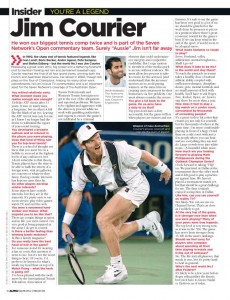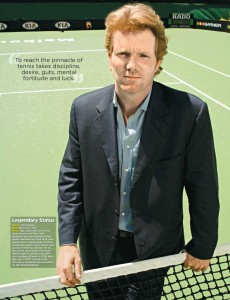 A slightly stilted interview with the former tennis No.1. It was done at his insistence via email, my least favourite technique, because the typing intervieweee never quite sounds like himself, and there’s no way to react to something he says – a proper conversation rather than an exchange of letters, as it were. Done for Alpha magazine in about 2007.
A slightly stilted interview with the former tennis No.1. It was done at his insistence via email, my least favourite technique, because the typing intervieweee never quite sounds like himself, and there’s no way to react to something he says – a proper conversation rather than an exchange of letters, as it were. Done for Alpha magazine in about 2007.
_________
In 1992, the sharp end of tennis featured legends like Ivan Lendl, Boros Becker, Andre Agassi, Pete Sampras and Stefan Edberg – but the world No.1 was Jim Courier. Possessing a great work ethic, big power and a battering forehand (not to mention flaming red hair and permanent baseball cap), Courier reached the final of all four grand slams, winning both the French and Australian Opens twice. He retired in 2000, though still plays on the Tour of Champions. Among his many other work commitments, he’s an incisive TV commentator, and is an important asset for the Seven Network’s coverage of the Australian Open.
You retired relatively early. What moment made you realise enough was enough?
I left the ATP circuit after 13 years. It was, in many way, a long time, but in others it felt like the blink of an eye. Leaving the ATP circuit was easy for me, as I knew I no longer had the desire to withstand the rigours of year-round touring.
 You developed a broader outlook and an interest in the places you were playing. Does that kind of thing ruin you for top-level tennis?
You developed a broader outlook and an interest in the places you were playing. Does that kind of thing ruin you for top-level tennis?
There is a school of thought out there that you must live in a bubble to succeed at the highest level of any endeavour, but I don’t subscribe to that theory. Tennis players have the time to be able to walk the streets of a foreign town, visit art galleries, see concerts or whatever they fancy. Having outside interests has kept me sane thus far.
Do other players develop similar interests?
Some players have outside interests, but they are in the minority. It’s pretty easy to eat room service, play video games, watch TV and surf the web.
You were a renowned hard-worked and trainer. What inspired you to be like that?
There are certain things in sport, and in life, you can’t control. I’m very good at being prepared in the areas I do get to control.
Is there a better feeling that winning tennis matches?
Is this a family magazine?
Do you really have the best head of hair in the game?
For someone noted for wearing a hat on court, this question is news to me, but it’s not the worst thing to hear. Of course, I’d prefer to be known for what’s inside my head than on top of it.
Match fixing – what the heck is going on?
I’ve been pleased with the swift move by the International Tennis Federation, Association of Tennis Professionals and Women’s Tennis Association to get to the root of the allegations and reported problems. We have to be vigilant and aggressive with the discovery process while we work with gambling authorities and experts to ensure the game’s not infiltrated by a criminal element that could undermine our integrity and competitive credibility. But I urge caution to members of the media quick to accuse without evidence. We must allow due process to take its course for the accused, [and understand] that the accusers’ motives are to avoid paying winners, at the same time as creating more awareness for their businesses via free publicity. One must always consider the source.
You give a lot back to the game. Do ex-pros have a duty to do that?
Top pros don’t have a duty necessarily, but the game suffers when players are miners and not farmers. It’s safe to say that the game has been very good to a lot of us; we should be grateful for the work done by pioneers to put us in a position where there’s great economic reward for the game’s best. If we can keep wind in the sails of the sports, it would seem to be a logical move.
What made Sampras so tough to play?
Serve, forehand, volley, athleticism, mental toughness… Shall I go on?
What does it take to be No.1 in the world and stay there?
To reach the pinnacle in tennis takes a healthy dose of natural athletic ability coupled with sufficient technique, discipline, desire, guts, mental fortitude and no small amount of luck with health. You’ll have to ask Roger, Pete, Rocket, Bjorn, etc, how to stay there for more than a year.
How does it feel to play a big match on a centre court, surrounded by thousands of screaming people?
It’s a great rush to hit a shot that creates joy not only for yourself, but for thousands of others at the same time. I’m more comfortable playing in front of a large crowd than on a side court with just a few people where you can hear and see everything they say and do. Large crowds turn into a white noise… A beautiful white noise.
How much are you looking forward to playing Mark Philippoussis during the Outback Champion series?
I look forward to taking “Flip” on. We practised in Dallas at the tournament there the other week and it felt good to play a practice set against him. We haven’t played a tournament match yet, but that should be a great challenge for me. The fans certainly enjoyed seeing him in Dallas.
Like him, can you see yourself on reality TV?
Not likely. You can see me on Channel Seven. That’s as close as I’m likely to get.
At the very top of the game, is it stronger now than when you were playing? Many of your peers were true legends.
The top level is very strong now, as it was in the ‘90s. The game has never been stronger from 15-100 in the men’s rankings.
Should we feel sorry for players who complain about spending all their time staying in hotels and living out of suitcases?
No. The life isn’t all glamour, that much is true, but it’s pretty hard to beat in general.
Who’s the next world No.1 after Federer?
It’s likely to be a few years before Roger relinquishes the throne, but you’d have to favour Nadal or Djokovic as of today.
________
See this as higher-res PDFs: